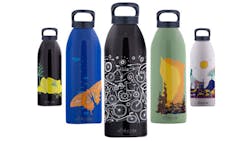Technology: Saving the World, One Bottle at a Time
Ryan Clark is out to save the world.
"There has got to be a better way," says the COO of Union Gap, Wash.-based Liberty Bottleworks, provider of kitschy, high-quality aluminum drinking bottles for eco-conscious retailers, marketers and corporations.
"That was the starting point for the company: There must be a better way of doing this."
By "this," he means of course the whole drinking bottle business; he means breaking the world of its single-use, plastic bottle addiction.
And he's done well toward that goal, already shipping as many as 70,000 bottles a month just four years after setting up shop.
But Clark's mission at Liberty isn't just to make reusable bottles to save the world from plastics. It's to do so in a manner that is equally sustainable, equally progressive and equally, well, good.
See Also: Manufacturing Industry Technology News & Trends
As he says, "We honestly believe that you can do well by being good. That was the whole impetus behind the company."
So he's not just making bottles at Liberty. He's making them out of recycled and recyclable materials. He's making them in a zero-waste facility that uses an impossibly small amount of energy, water and other resources. He's making a dynamic product, customizable and unique, produced by a staff actually in need of jobs—out-of-work machinists and artists, veterans and artisans. And, most importantly, he's doing it all in the U.S. at a price point that beats his mass-producing competition in China.
So, basically he's making a better world by finding a better way to do just about everything.
"We knew that if we were going to do this—and if we were going to make any money doing it—we were going to have to reinvent the manufacturing environment," he says. "We knew we were going to have to build a super state-of-the-art, very high tech manufacturing environment all on our own."
He also knew that for his state-of-the-art factory to perform, he would need a state-of-the art back-end ERP system powerful enough to track its waste and consumption, its costs and efficiencies, and each of its 20,000 or so product variations as the company scaled up to profitability.
In other words, to change the world, he needed an ERP system nimble enough for change.
And that meant going to the cloud.
A Platform for Continuous Improvement
"We knew from day-one that our ERP system had to be cloud-based," Clark recalls. "We knew that our factory would only ever be as good as its weakest link. A room full of servers and IT people and equipment we don't know how to work standing in our way? Well, that's a pretty weak link."
This side of the recession, with new businesses popping up every day guided by millennial ideals and system-razing mission statements like Liberty, is becoming a very familiar story.
"We're seeing an increasing number of transformational companies like this popping up across the industry," explains Keith Mattioli, principal consultant at KPMG's IT Advisory Services.
"These companies are turning to the cloud as a way not just to transform their business, but to create a platform for continuous improvement, for continuous transformation," he explains.
"They don't just want to be nimble today," he says. "They want to be nimble every day in the future."
Cloud systems, he says, allow architectures that are, by nature, elastic enough to allow startup manufacturers to pursue these new business models and aggressively disruptive schemes. And as these companies proliferate, he says, robust cloud systems like NetSuite, Plex or Infor are becoming the defacto choice of the next generation.
"We're a small company without a big budget for IT," Clark says. "But we have big ideas and a lot of plans. If not for a cloud-based operating system, if not for the kind of flexibility it gives us, we couldn't do what we do."
"We could never change the world without it," he adds.
About the Author
Travis M. Hessman
Editor-in-Chief
Travis Hessman is the editor-in-chief and senior content director for IndustryWeek and New Equipment Digest. He began his career as an intern at IndustryWeek in 2001 and later served as IW's technology and innovation editor. Today, he combines his experience as an educator, a writer, and a journalist to help address some of the most significant challenges in the manufacturing industry, with a particular focus on leadership, training, and the technologies of smart manufacturing.
